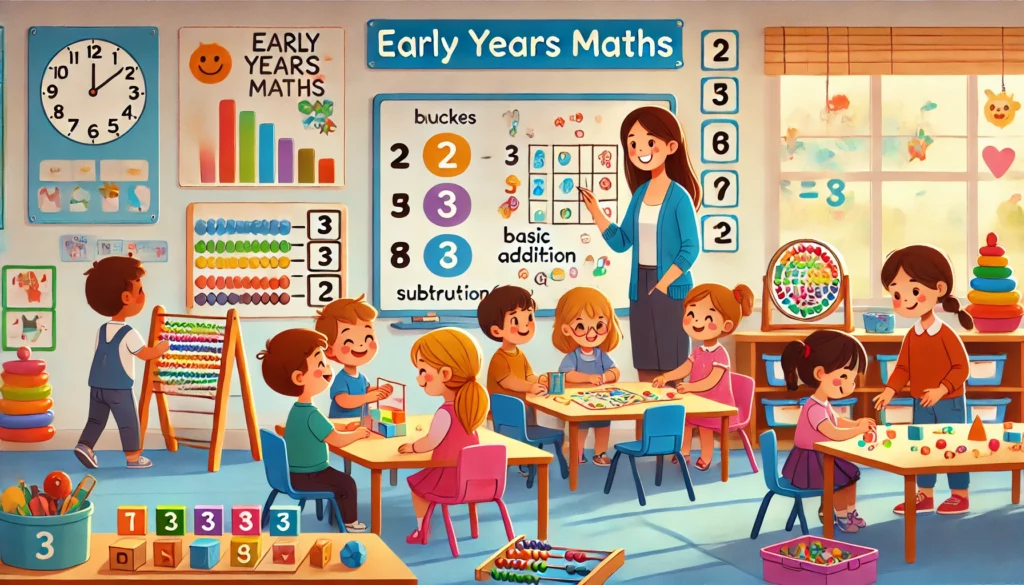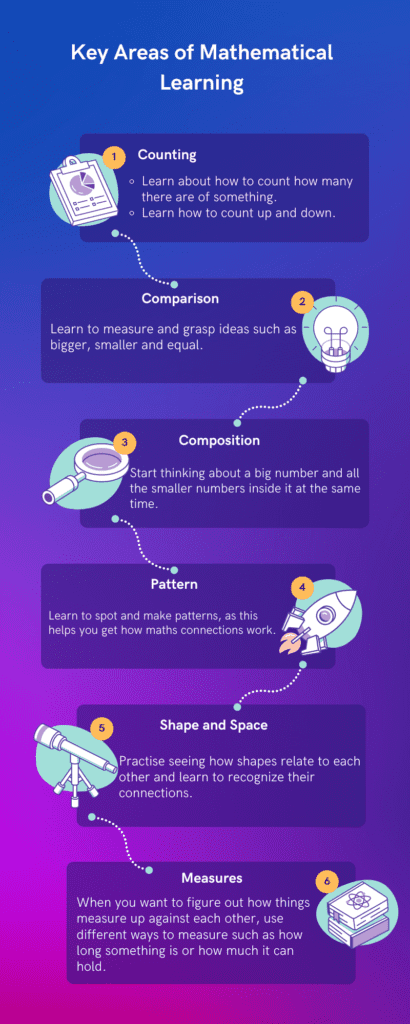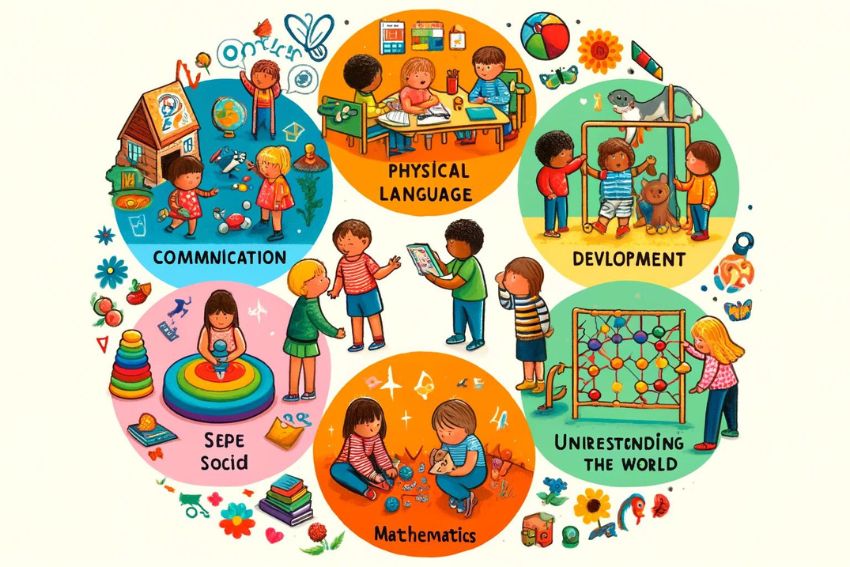Early Years Maths is one of the four main learning areas in the seven areas of learning in the Early Years Foundation Stage. It’s really important for little kids to get good at maths early on so they can do well later. It’s really important for little kids to get good at maths early on so they can do well later. This guide has helpful tools, clear explanations, and good ways to help parents and teachers with teaching young children about maths.

Understanding Early Years Maths
Number
Get really good at knowing numbers up to 10 by doing fun things that let you see amounts without having to count them, a trick called subitising, for numbers up to 5. Also, remember pairs of numbers that add up to 5, and start learning some pairs that add up to 10. Knowing this basic stuff about numbers will help you with harder maths later on.
Numerical Patterns
Talking out loud numbers higher than 20 helps you get better at understanding big numbers and feeling more sure of yourself when you use them. Looking closely at numbers up to 10 helps you figure out which one is bigger or smaller and starts to get you thinking about the idea of more or less. Also, diving into the world of numbers lets you spot and tell the difference between even and odd numbers. This starts to show you how numbers link together and form patterns. Learning about numbers in this well-rounded way gets you ready for tackling tough maths problems and sharpens your problem-solving skills.
Why Early Years Maths is Important
Knowing maths early on helps kids do better in school later, including with reading and overall learning. Kids who understand maths when they’re young usually have better results as they grow up and keep learning.
Key Areas of Mathematical Learning

1. Counting
- Learn about how to count how many there are of something.
- Learn how to count up and down.
2. Comparison
- Learn to measure and grasp ideas such as bigger, smaller and equal.
3. Composition
- Start thinking about a big number and all the smaller numbers inside it at the same time.
4. Pattern
- Learn to spot and make patterns, as this helps you get how maths connections work.
5. Shape and Space
- Practise seeing how shapes relate to each other and learn to recognize their connections.
6. Measures
- When you want to figure out how things measure up against each other, use different ways to measure such as how long something is or how much it can hold.
The Early Years Maths Curriculum
The Early Years Maths curriculum in the UK is designed to set the foundation for children’s mathematical understanding from birth to five years old. A well-structured Early Years Maths curriculum not only supports children’s cognitive development but also makes your nursery distinctive, attracting prospective parents and ensuring a brighter future for the children.
Play is essential for developing mathematical skills in young children. The curriculum encourages learning through play, allowing children to explore numbers, shapes, and patterns in a fun and engaging environment. Teachers regularly assess children’s mathematical development and share insights with parents to ensure continuous growth and improvement.
Involving parents in their child’s mathematical learning journey is crucial. It fosters a collaborative approach to education and helps reinforce learning at home. Recognising that each child is unique, the Early Years Maths curriculum supports personalised learning experiences to meet individual needs and help every child succeed.
The Early Years Maths curriculum is vital for early childhood education, focusing on play-based learning, individual attention, and parental involvement. By following this curriculum, nurseries can ensure high-quality mathematical education and care, setting children up for future success.
Practical EYFS Maths Resources
moreover, making maths fun and interesting for little kids is important. Some good tools are Reception Numbers Worksheets, which let kids practise counting and writing numbers Early Years Maths Books, which explain maths ideas in a fun way Activities and Games, which are a fun method to learn maths and Paper Craft Activities, which help kids understand maths ideas by being creative.
Preparing Your Child for Reception Maths
Before kids start learning Math in school, it’s really helpful if they know some basic things first. These can make learning easier and more fun for them later on. They should practise counting up and down, which is great for understanding order and simple adding or taking away. Knowing about money and how to tell the time is also important because it shows them how we use maths in daily life. Doing things like baking is a good way to bring these ideas together, as kids can see how to measure stuff and follow instructions step by step.
To help kids enjoy learning maths, there are awesome books out there. Kids love the ‘Dinosaur Number Writing Book’ and the ‘Pirate Number Writing Book’ because they make writing numbers fun with cool themes. Also, the ‘Sorting Numbers from 1 to 5 Game’ helps kids learn to recognize and put numbers in order. Then, there’s a bunch of fun online maths games that keep kids wanting to learn more. All these tools together make sure little ones get the hang of basic maths, making them ready and excited to start school.
Effective Teaching Strategies For Early Years Maths
Concrete-Pictorial-Abstract (CPA) Approach
The Concrete-Pictorial-Abstract (CPA) Method is a way of teaching maths that moves through three key phases to help kids grasp maths ideas better. First, during the concrete phase, kids get to use real objects to figure out problems, which means they can touch and move things around to understand concepts in a real-world way. Next, in the pictorial phase, they start drawing these objects.
This step acts like a bridge, making it easier for them to go from dealing with actual, touchable things to thinking in more abstract terms. Finally, comes the abstract phase, where they use maths symbols to represent problems. This way, they can solve problems and do maths without needing the real objects or drawings anymore. This method works so well because it builds on what kids already know and understand from each step, deepening their understanding of maths concepts along the way.
Cognitive Load Theory
Cognitive Load Theory tells us that it’s really important to concentrate on the main things we need to learn so we don’t overload kids’ memory. We have to be clear when we share information and stay away from things that could distract us. This helps make sure that learning works well and is effective. By cutting down on the extra stuff that doesn’t help with learning, kids can understand and remember new things easier, making it more likely for them to do well in school.
Continuous Provision
Continuous Provision is about setting up places to play inside and outside that help kids keep learning. By having different things to do and play with, children get to explore and find out things on their own. This way helps kids keep getting better at what they know and can do, mixing play and learning together. It changes to fit how fast each kid learns and what they like.
Fun Activities to Boost Number Sense
- Teaching Kids About More and Less: Use pictures to make it easier for kids to get the idea.
- Bunny Ears: Learn to use your fingers to count and show different numbers, which helps you think about numbers in various flexible ways.
- Learn to Count in Tens: Teach kids how to count by organising objects into groups of ten.
- Let’s have a quick and fun game: get kids to put blocks into a 10-grid as fast as they can to see how good they are with numbers!
Developing Positive Attitudes towards Maths
Building a strong love for maths early on is key. We can help kids by showing them how to see patterns and links, encouraging them to share what they notice. It’s also important to create a space where making mistakes is okay. This way, they grow more confident and tough in their maths skills.
Conclusion: Early Years Maths
Learning early maths is key to doing well in school later on. When parents and teachers use fun tools, hands-on activities, and good ways to teach, they can make kids love maths and really get the ideas.
Check out different early years maths resources and make learning maths exciting for your child now!
With Edumentors tutors, learners have the luxury of integrating their tutoring sessions effortlessly into their busy calendars. This valuable flexibility aids in proficiently managing both schoolwork and other obligations. What amplifies Edumentor’s impact further is its knack for personalizing lessons according to each student’s distinct learning methods & needs – a genuinely invaluable addition! Consequently, students bask in an elevated scholastic journey that isn’t merely fruitful but incredibly fun as well!









